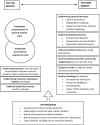What are fair study benefits in international health research? Consulting community members in Kenya
- PMID: 25470596
- PMCID: PMC4254456
- DOI: 10.1371/journal.pone.0113112
What are fair study benefits in international health research? Consulting community members in Kenya
Abstract
Background: Planning study benefits and payments for participants in international health research in low- income settings can be a difficult and controversial process, with particular challenges in balancing risks of undue inducement and exploitation and understanding how researchers should take account of background inequities. At an international health research programme in Kenya, this study aimed to map local residents' informed and reasoned views on the effects of different levels of study benefits and payments to inform local policy and wider debates in international research.
Methods and findings: Using a relatively novel two-stage process community consultation approach, five participatory workshops involving 90 local residents from diverse constituencies were followed by 15 small group discussions, with components of information-sharing, deliberation and reflection to situate normative reasoning within debates. Framework Analysis drew inductively and deductively on voice-recorded discussions and field notes supported by Nvivo 10 software, and the international research ethics literature. Community members' views on study benefits and payments were diverse, with complex contextual influences and interplay between risks of giving 'too many' and 'too few' benefits, including the role of cash. While recognising important risks for free choice, research relationships and community values in giving 'too many', the greatest concerns were risks of unfairness in giving 'too few' benefits, given difficulties in assessing indirect costs of participation and the serious consequences for families of underestimation, related to perceptions of researchers' responsibilities.
Conclusions: Providing benefits and payments to participants in international research in low-income settings is an essential means by which researchers meet individual-level and structural forms of ethical responsibilities, but understanding how this can be achieved requires a careful account of social realities and local judgment. Concerns about undue inducement in low-income communities may often be misplaced; we argue that greater attention should be placed on avoiding unfairness, particularly for the most-poor.
Conflict of interest statement
Figures
References
-
- CIOMS (2002) International Ethical Guidelines for Biomedical Research Involving Human Subjects. - PubMed
-
- NCST (2004) Guidelines for the Ethical Conduct of Biomedical Research Involving Human Subjects in Kenya. Nairobi: National Council for Science and Technology, Republic of Kenya.
-
- Permuth-Wey J, Borenstein AR (2009) Financial remuneration for clinical and behavioral research participation: ethical and practical considerations. Ann Epidemiol 19:280–285. - PubMed
-
- Diallo DA, Doumbo OK, Plowe CV, Wellems TE, Emanuel EJ, et al. (2005) Community permission for medical research in developing countries. Clin Infect Dis 41:255–259. - PubMed
Publication types
MeSH terms
Grants and funding
LinkOut - more resources
Full Text Sources
Other Literature Sources


